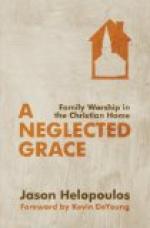is pleasing to us. It is a bitter cup we love
to drink; we love to keep open the wounds there inflicted.
The sadness we then feel we dearly cherish; and we
linger around these tombs as if bound to them by some
mystic chord we could not break; we are loth to leave
a spot in which are accumulated the fondest associations
of early life. Would the mother, if she could,
forget the child that slumbers beneath the flower-crowned
sod of the family cemetery? “Where,”
in the beautiful language of Irving, “is the
child, that would willingly forget the most tender
of parents, though to remember be but to lament?
Who, even in the hour of agony, would forget the friend
over whom he mourns? Who, even when the tomb
is closing upon the remains of her he most loved and
he feels his heart, as it were, crushed in the closing
of its portals, would accept consolation that was
to be bought by forgetfulness? And when the overwhelming
burst of grief is calmed into the gentle tear of recollection,
when the sudden anguish and the convulsive agony over
the present ruins of all that we most loved, is softened
away into pensive meditation on all that it was in
the days of its loveliness, who would root out such
a sorrow from the heart? Though it may sometimes
throw a passing cloud even over the bright hour of
gayety, yet who would exchange it even for the song
of pleasure or the burst of revelry? No; there
is a voice from the tomb sweeter than song; there is
a recollection of the dead to which we turn even from
the charms of the living!” How passionately
we cling to those memories of a sainted mother, which
crowd in rapid succession upon our minds!
“Weep not for her! Her memory
is the shrine
Of pleasing thoughts, soft
as the scent of flowers,
Calm as on windless eve the sun’s
decline,
Sweet as the song of birds
among the bowers.”
What a purifying and restraining influence does the
memory of a pious parent’s love, exert upon
the wayward child! When he bends in mournful
recollection over the grave of a sainted mother, how
must every heart-string break, and with what remorse
he reviews his past life of wickedness and filial
disobedience. The memory of that mother’s
love and kindness to him, haunts him in all his revels,
and draws him back, as if by magnetic force, from
scenes of riot and of ruin. Can he think of that
mother’s prayers and teachings and tears of solicitude,
and not feel deeply, and often savingly, his own guilt
and ingratitude? If there is a memory of home-life
which allures him to heaven, it is the recollection
of her love and pious efforts to save him.




